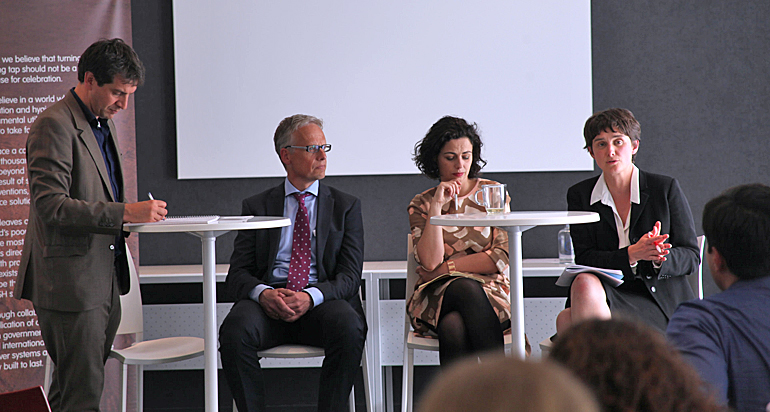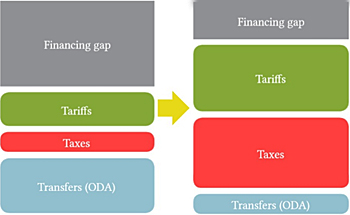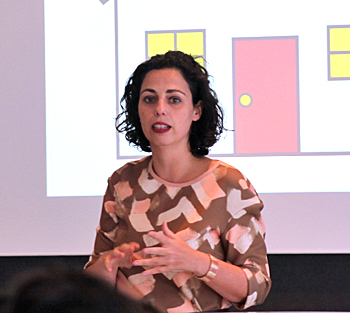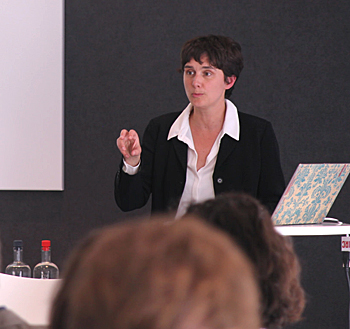Smart tax can bridge financial gap to meet universal access to water and sanitation

We have just five years to get the financing mechanisms right if we want to achieve universal access to water and sanitation by 2030. IRC's head innovation and international programme Catarina Fonseca issued this warning at a meeting on mobilising domestic finance for water, sanitation and hygiene.
The meeting was held in the Hague, the Netherlands, on 3 June and was organised by IRC Wash.
 Financial support from donor countries (transfers) is expected to decrease, so in order to raise the money that is needed to create universal access to safe drinking water and improved toilets, tariffs and taxes shall have to go up.
Financial support from donor countries (transfers) is expected to decrease, so in order to raise the money that is needed to create universal access to safe drinking water and improved toilets, tariffs and taxes shall have to go up.
Bridging the financial gap
The meeting raised the question how much money is actually needed if the world wants to achieve universal access to water and sanitation by 2030.
Based on World Health Organization estimates about 27 billion USD a year is needed to extend water services to everyone by 2030. And an additional 290 billion USD is needed to maintain or replace existing infrastructure.
So the answer is a grand total of 317 billion USD a year.
"This means spending more and faster than we are doing now", stated Fonseca, introducing the financial gap to realise UN's sustainable development goal nr. 6 on water.
The United Nations are to adopt the post-2015 sustainable development goals at their next general assembly in September in New York.
The financial resources that are needed to reach all 17 SDG-goals by 2030, will be the number one topic on a special UN summit in Addis Ababa, Ethiopia in July.
 Tax, tariffs and transfers
Tax, tariffs and transfers
According to Fonseca taxes play a key role in bridging the gap. "They are not only the largest source of funds for public infrastructure but they can leverage tariffs and transfers", she said.
Fonseca referred to the global debate on how to finance the required infrastructure for universal access to water and sanitation.
In wealthy countries the water infrastructure is usually financed by consumers paying for their water service (tariffs). In poor countries it is not always possible to fully charge the price of water to the consumers and therefore the realisation of new water infrastructure heavily depends on grants and loans (transfers) from international donors and development banks.
A local tax can be an additional option to finance a water project, in situation where the revenues from tariffs are insufficient for the sound financing of a new water facility that includes the costs of the maintenance and the service delivery.
Special bank owned by local water authorities
Another way to get more money faster, is through a public sector bank like the Dutch NWB Bank, which was established in 1954 and is owned by local water authorities.
At the IRC meeting the bank's director Frenk van der Vliet explained how the governance structure of his organisation enabled it to provide low interest loans with long payback periods.
The NWB Bank has a 88 billion euro balance sheet and its clients have never defaulted on their loans.
 Improvement of public finance
Improvement of public finance
Public finance needs to be spent wisely to complement rather than substitute for other financing sources, said the final presenter at the meeting, Sophie Trémolet, director at Trémolet Consulting.
Trémolet advocate a better monitoring of the public financing to be able to improve its spending. She specially encouraged to make more costs-benefit analyses to make better desicions between alternatives.
She noted a mismatch between public finance mobilised at national level and spent at local level. "The governance of WASH-projects is decentralised but this is seldom accompanied with fiscal decentralization".
Trémolet urged to establish funding mechanisms to pool funds at central level and channel them to local level.
Her presentation listed numerous good practices as to improve the 'public finance cycle' such as a district development facility in Ghana, a water service trust fund in Kenya and a repayable finance service in Brasil.
Better understanding of domestic WASH finance
Both Catarina Fonseca and Sophie Trémolet are involved in the initiative Public finance for Wash that was set up in 2014 by individuals from Water & sanitation for the urban poor (WSUP), IRC and Trémolet Consulting.
The initiative aims to raise awareness and understanding of domestic public finance solutions for WASH and to encourage a positive and creative attitude to domestic public finance solutions within the donor and NGO community.
A report on the IRC-meeting is published on the website of IRC Wash.
More information
IRC Wash
The Hague, the Netherlands
+31 70 3044000
www.ircwash.org
Trémolet Consulting
+ 447730496835
www.tremolet.com
Public Finance for WASH
www.publicfinanceforwash.com



